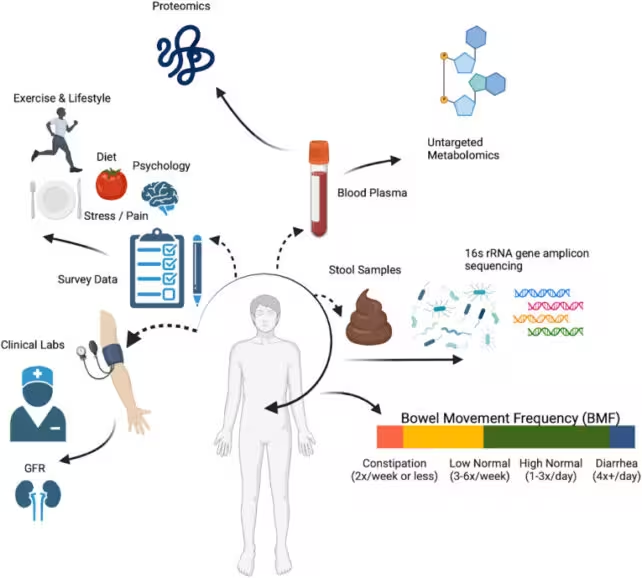5 Minutes
How often you have a bowel movement is more than just a personal routine—it could be a key indicator of your overall health. A newly published study in July 2024 sheds light on the relationship between bowel movement frequency and the risk of developing chronic diseases, using a blend of demographic, metabolic, and genetic analysis for unprecedented insight.
Scientific Background: Investigating the Gut Microbiome
The study, conducted by researchers at the Institute for Systems Biology (ISB) in collaboration with the University of Washington, focused on 1,425 generally healthy participants. By excluding individuals with conditions such as kidney disease, irritable bowel syndrome (IBS), or Crohn's disease, the team ensured that the results reflected typical, everyday variations in bowel habits. Each participant reported their average weekly frequency of bowel movements, which the scientists grouped into four categories:
- Constipation: 1–2 bowel movements per week
- Low-normal frequency: 3–6 movements per week
- High-normal frequency: 1–3 movements per day
- Diarrhea: 4 or more watery stools per day
In addition, researchers analyzed blood metabolites, genetic data, and the makeup of gut microbiota from stool samples, seeking patterns that reveal how bowel frequency might impact health on a systemic level.
Key Discoveries: The "Goldilocks Zone" of Bowel Movement Frequency
Findings from the ISB team highlight a nuanced balance: the healthiest individuals fell into the so-called "Goldilocks zone," experiencing one to two bowel movements daily. According to Sean Gibbons, microbiologist and the corresponding author, “Bowel movement frequency impacts all organ systems, and deviations can serve as early warning signals for chronic disease risk.”
Individuals suffering from constipation or chronic diarrhea exhibited significantly different biological profiles. Constipation was linked to higher concentrations of bacteria that ferment protein—a process associated with the production of potentially harmful toxins. Notably, blood samples from these participants showed elevated levels of indoxyl-sulfate, a toxic metabolite linked to protein fermentation and kidney damage. These findings reinforce long-standing concerns among gut health experts about the systemic consequences of infrequent bowel movements.
Conversely, those with frequent diarrhea displayed increased presence of bacteria typically found in the upper gastrointestinal tract, and blood markers suggestive of liver stress or damage. These microbiome shifts, coupled with changes in blood chemistry, illustrate how digestive irregularities can ripple throughout the body.

Expert Commentary and Potential Health Strategies
Johannes Johnson-Martinez, ISB bioengineer and study co-author, elaborates: “When stool remains too long in the gut, microbes exhaust dietary fibers and shift to protein fermentation, generating toxins that may enter the bloodstream. This emphasizes the importance of regular bowel habits for preventing metabolic and organ-related complications.”
Promisingly, lifestyle factors appear to interact with gut health. Participants within the optimal range (“Goldilocks zone”) reported higher dietary fiber intake, greater water consumption, and more frequent physical activity. Their gut microbiome profiles also revealed enrichment of fiber-fermenting bacteria, known to foster beneficial short-chain fatty acids linked with reduced inflammation and improved metabolic health.
Implications for Public Health and Future Gut Microbiome Research
This landmark research provides compelling evidence that bowel movement frequency may be a vital, yet underappreciated, health metric. Changes in stool regularity may offer early clues to developing metabolic or organ dysfunction, and could shape future strategies for gut health optimization in the general population. The researchers suggest that interventions focusing on diet, hydration, and exercise could prove valuable—not only for those experiencing obvious bowel irregularities, but for all individuals seeking to maintain optimal health and reduce long-term disease risk.
Conclusion
The frequency of bowel movements is emerging as an important indicator of whole-body health, closely tied to gut microbiota composition and metabolic markers. By establishing a benchmark for what constitutes healthy bowel habits, this study opens the door to more personalized preventive care, leveraging the power of nutrition, hydration, and daily routines. As gut health research accelerates, monitoring bowel regularity may soon become a routine part of health assessments—helping millions better understand and improve their overall well-being.



Comments